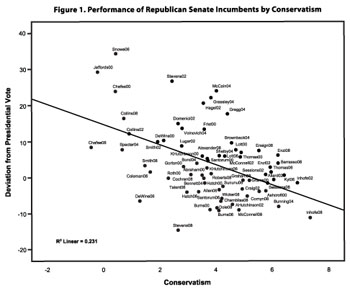Lots of lefty econ bloggers have suggested that the answer to our financial woes is a walloping big second stimulus. But we aren’t getting one. Tyler Cowen thinks that should tell us something:
Reading the Keynesian bloggers, one gets the feeling that it is only an inexplicable weakness, cowardice, stupidity, whatever, that stops policies to drive a more robust recovery. The Keynesians have no good theory of why their advice isn’t being followed, except perhaps that the Democrats are struck with some kind of “Republican stupidity” virus. […] The thing is, that same virus seems to be sweeping the world, including a lot of parties on the Left.
Romer, Geithner, Summers, et.al. know all the same economics that Krugman and DeLong and Thoma do. If a bigger [aggregate demand] stimulus would set so many things right, they’d gladly lay tons of political
capital on the line to see it through and proclaim triumph at the end of the road.
Except they expect it would bring only a marginal improvement.
Now, there are a few things to say about this. First, Tyler’s definition of “marginal” might be different than, say, Krugman’s. Would a two-point drop in unemployment be marginal? Or dramatic? Second, it doesn’t have to be weakness or cowardice driving the Obama team’s actions. If, for whatever reason, they’ve concluded that a second stimulus is simply politically impossible, then they’re going to turn their attention elsewhere no matter what they think about it. That’s just common sense. Third, even if a ton of political persuasion might (barely) push a second stimulus bill through, it might be too late. They might disagree with Krugman et. al. not on fundamental grounds, but simply on timing.
But despite all this, there’s one pretty good reason to think that Tyler is basically right: tax cuts. Lefty economists might generally believe that increasing spending is a more efficient way of stimulating consumption than reducing taxes, but they’d almost certainly accept a big tax cut as an almost-as-good substitute. And tax cuts have two big advantages over spending. On the substantive side, they work faster. Spending takes time to work its way through the economy, but a tax cut (for example, a payroll tax holiday) boosts the economy almost immediately. And on the political side it’s quite doable. Republicans would be persuadable because they love tax cuts and Democrats would be persuadable because it would help the economy. For Obama, then, it would be the best of all worlds: a fast stimulus that gets bipartisan support, something that boosts the economy while dampening the inevitable criticism he’d get for blowing up the deficit.
But he’s not pushing for this. Not even quietly. And this suggests that Tyler is right: Obama’s advisors might be in favor of further fiscal stimulus, but not by much. And the best explanation for this is that lefty or not, they’re genuinely afraid, as Tyler says, that it would bring only marginal improvements at the cost of significant problems down the road.
But would it? I’d like to hear more about this. I feel like the liberal economic community is largely getting a free pass on this because the opposition has been so stupid: if you’re arguing that inflation (or hyperinflation!) is a near-term threat that needs to be vigilantly opposed, it’s pretty easy to explain why this is wrong. But the better argument is that inflation is a long-term threat that has to be contained early, because once the genie pokes its head out of the bottle it’s very, very hard to stuff it back in. And the medicine it takes to do the stuffing is painful indeed.
Now, that argument might be wrong too. But because conservatives mostly aren’t making it, liberals mostly aren’t taking it on. But they should. Political realities being what they are, reining in the federal deficit will be hard even under the best of circumstances, and if we decide to make it worse now it’s going to become even harder to rein in down the road. That’s not a problem for today or tomorrow, but it might well be a problem in 2015. Right?

 I asked this once a while back, but now that the iPad has been out for a while I want to ask again: how good is it for reading nonfiction books? Specifically, I have two questions for iPad users who read a fair amount of nonfiction:
I asked this once a while back, but now that the iPad has been out for a while I want to ask again: how good is it for reading nonfiction books? Specifically, I have two questions for iPad users who read a fair amount of nonfiction: in 1790, the system remains badly fractured and fundamentally unfair.
in 1790, the system remains badly fractured and fundamentally unfair. after 9/11, super agent Jack Bauer has been fighting terrorists on American soil, and in many ways the show’s message was a neocon’s wet dream: America was always under relentless attack; the bad guys were from the Middle East as often as not; time bombs really, literally, ticked; and torture not only worked, it was practically a patriotic duty.
after 9/11, super agent Jack Bauer has been fighting terrorists on American soil, and in many ways the show’s message was a neocon’s wet dream: America was always under relentless attack; the bad guys were from the Middle East as often as not; time bombs really, literally, ticked; and torture not only worked, it was practically a patriotic duty.

 Has the Republican Party lost sight of its roots? Does it need to return to a purer version of conservatism in order to return to power? Alan Abramowitz takes a look at the recent evidence in Senate races and concludes just the opposite: the more conservative a Republican candidate is,
Has the Republican Party lost sight of its roots? Does it need to return to a purer version of conservatism in order to return to power? Alan Abramowitz takes a look at the recent evidence in Senate races and concludes just the opposite: the more conservative a Republican candidate is,  that
that 


